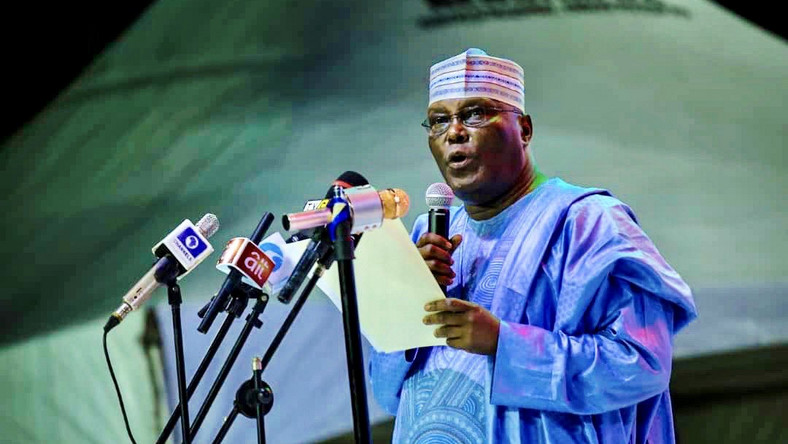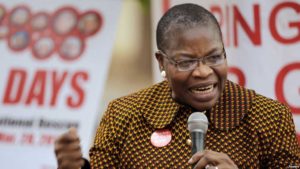On Wednesday, February 27, the Independent National Electoral Commission (INEC) declared Muhammadu Buhari of the All Progressives Congress (APC) the winner of the 2019 presidential election.
On the same day, the presidential candidate of the Peoples Democratic Party (PDP), Atiku Abubakar, released a statement in which he pointed out several issues with the electoral process. Atiku concluded his statement saying:
I hereby reject the result of the February 23, 2019 sham election and will be challenging it in court.
The decision to reject the results of the elections by Atiku and the PDP has since set in motion a series of events which this article aims to chronicle as Nigerians, and indeed the world, look towards the inauguration of incumbent and president-elect, Muhammadu Buhari.
First Came the Rejection
Prior to the official rejection statement, the PDP had urged INEC to stop the collation of results for the presidential election, highlighting seven reasons they felt this was necessary. However, with the refusal of INEC to halt the collation process and the declaration of Buhari as the winner, the PDP went on to list even more reasons why the February 23 elections were a “sham.”
The party claimed that some of the issues which were observed had been “premeditated malpractices” which negated the election results. They presented documented evidence for about 16 cases of electoral malpractices, including rigging, snatching of ballot boxes, burning of ballot papers; violence against voters and electoral officers, etc.
Keeping with the decision to challenge Buhari’s victory in court, Atiku inaugurated a legal team headed by Dr. Livy Uzoukwu (SAN), on March 2, and on March 18, the party officially filed its petition.
Then Came the Petition, Evidence, and Denial
As part of the evidence presented to challenge Buhari’s victory, Atiku and PDP’s legal team presented an alternative result to the Presidential Elections Petition Tribunal (PEPT) which showed that Atiku had won by a total of 18 million votes, defeating Buhari who, they claimed, had gotten 16 million votes. The alternative results had allegedly been released by an INEC whistleblower who had access to the commission’s internal server.
The PDP also presented unique identification information of computers which they claimed belonged to INEC while calling experts from Microsoft, IBM, and Oracle to corroborate the information.
The Electoral Commission responded to PDP’s allegations by stating that the alternative results had been fabricated and “invented for the purpose of this case.”
Meanwhile, the APC agreed with INEC’s claims that the server results had been fabricated and further claimed that the PDP had illegally intercepted a public institution’s communications system. However, the PDP in response presented an affidavit from 12 INEC officials who they claimed will testify against the Commission.
Presidential Elections Petition Tribunal (PEPT) Inaugural Hearing, and the Case against Bulkachuwa
The PEPT is a panel of five judges sitting at the Court of Appeal in Abuja. As the name implies, the tribunal, by law, is assigned to preside over presidential and vice-presidential election matters and by such powers will preside over the petitions related to the presidential election, including the case against Buhari’s victory as filed by Atiku and the PDP.
The tribunal had its inaugural sitting on Wednesday, May 8 and fixed May 15 as the date to begin hearing on filed petitions. The tribunal has about 180 days (from the date of filing of the petition) to hear and deliver its judgment, and with an alleged 400 witnesses set to testify, in the case, the PEPT has no time to waste. However, for the PDP, one problem stands in the tribunal’s way; the person of Justice Zainab Bulkachuwa, the President of Nigeria’s Courts of Appeal and head of the PEPT.
Justice Bulkachuwa is married to Adamu Mohammed Bulkachuwa, who is a member of the APC and a Bauchi State senator-elect. Additionally, her son, Aliyu Haidar-Abubakar is also a prominent member of the APC. According to the PDP, Justice Bulkachuwa’s ties to the APC creates the possibility of bias in the execution of her duties as the head of the PEPT.
The PDP filed an official motion on May 16 requesting an order to rescue Justice Bulkachuwa from further participation in PEPT proceedings and for her to be replaced by another Justice of the Appeal Court. The case has been slated for hearing on May 22.
Does this Affect The Presidential Inauguration?
Simply, no. None of this legal drama will affect Buhari’s inauguration, except it is established by the PEPT between now and May 29 that he, in fact, was not the winner of the February elections. However, despite the ongoing legal drama and other cases against Buhari’s victory at the Election Tribunal, the federal government is still carrying on with plans to inaugurate President Buhari on May 29. Even though the celebrations marking the inauguration will hold on June 12, given the recent declaration of the day as Nigeria’s new Democracy Day.




